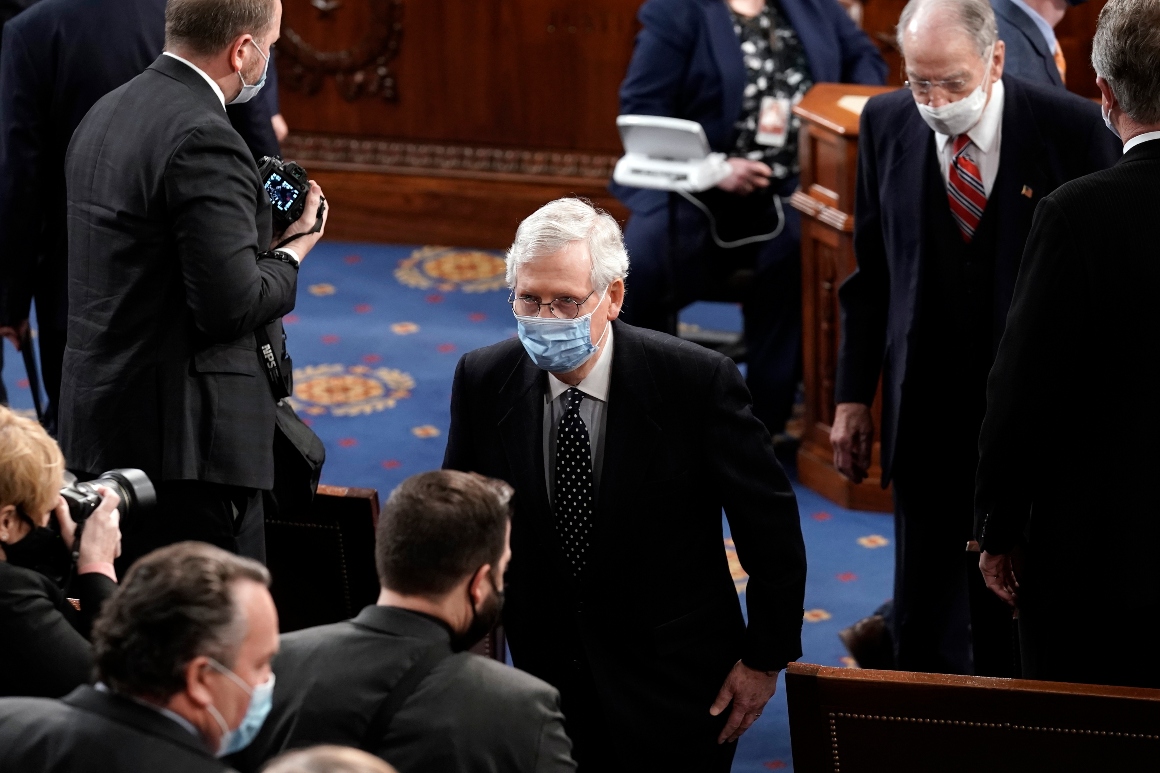Senate Republicans talk as a party as many as three times a week during normal times. But these times are anything but normal.
The Senate GOP has not spoken as a conference for more than two weeks now, since Senate Majority Leader Mitch McConnell asked Sen. Josh Hawley (R-Mo.), who wasn’t present, to explain his plans to challenge the election in a party conference call. Since that Dec. 31 conversation, eight senators challenged the election results, the Capitol was overrun by pro-Donald Trump rioters and the president was impeached.
And while Republicans are at odds with Trump, it might not translate to the kind of bipartisan condemnation that an impeachment trial requires for conviction.
“There’s a lot of people upset. But the legal standard for inciting insurrection is going to be pretty hard to prove because his words matter. And his words were reckless and his words certainly had an impact on how fired up people were. But his words were also carefully selected,” said Sen. Kevin Cramer (R-N.D.). “If you’re going to take him at his word, his words were ‘protest peacefully and patriotically.’ I just think it’s a pretty hard standard to prove.”
Now, as McConnell’s conference prepares to enter minority status and faces another grueling impeachment trial, senators are largely being left without guidance from leadership over how to come down on Trump. The conference, so divided now over the outgoing president, is being given space to breathe, according to three senators who spoke on the condition of anonymity.
“He’s just letting the conference kind of cool down after the certification,” said one GOP senator of McConnell. With so much uncertainty about when the trial will start and handing power off to Democrats, “all we’d be doing is having the circular discussions, what ifs.”
Another senator said there’s been little member-to-member contact among the rank and file too as everyone processes the last two weeks, including the remote possibility of 17 GOP senators joining Democrats to convict the president of impeachment and prevent him from ever holding public office again.
And after McConnell helped lead the defense, coordinated with the White House and declared there was “no chance” of convicting Trump at the president’s trial just a year ago, the majority leader is keeping an open mind about whether to convict the president of “incitement of insurrection,” associates say. Other than a Dear Colleague letter he penned on Wednesday, there’s been little overall instruction from the current majority leader to his members.
It’s a stunning development for McConnell, going from a gung-ho acquittal quest last January to considering whether to convict the president after he’s left office. Trump’s approval ratings have also cratered in the wake of the deadly attack on the Capitol, with a Pew Research Center survey on Friday showing just a 29 percent approval rating. Such a number could make it easier for some in the GOP to turn on Trump ahead of the 2022 midterms.
“The way in which he acts between now and Wednesday will have bearing on what Republican senators do,” said Sen. Chris Murphy (D-Conn.) of Trump. Republicans “probably have some strategic decision to make about the future of their party. But I’ve learned to be disappointed by my Republican colleagues.”
Very few Senate Republicans have publicly made any statements about impeachment and many declined interviews this week. Many will say the trial is unconstitutional or impractical once Trump has left office.
“I’m skeptical because it’s irrelevant in so many respects. It’s distracting, it’s divisive and I just can’t imagine that an incoming administration wants to keep Donald Trump on the front page while they’re trying to fill their first 100 days with meaningful successes,” Cramer said.
It is notable, however, how few Republicans are defending Trump on the merits. And House Democrats managing the trial could create some goodwill with on-the-fence Republicans by keeping Trump’s second trial concise, easy to follow and bare bones, said one aide to a Republican senator.
Republicans are split into as many disparate factions as you could imagine. There’s Sen. Lisa Murkowski (R-Alaska), who found that the House acted “appropriately” in impeaching the president. And Sen. Pat Toomey (R-Pa.) declared Trump “committed impeachable offenses” though has not committed to convicting him. Sen. Mitt Romney (R-Utah) is the only Senate Republican who voted to convict Trump last time around.
Meanwhile some Republicans argue that it’s not constitutional to hold a trial after Trump has left office, which is now the most likely result of the House’s impeachment trial. Sen. Rick Scott (R-Fla.) said that the Democrats have gone off the “deep end” in impeaching the president a second time.
“Should the president have said something faster to tell people not to, after they were [rioting], not to do it? Sure,” Scott said on Hugh Hewitt’s show Thursday. “But did he tell people to go into the Capitol? Absolutely not.”
Scott was among the Republicans who challenged the election results, and some have highlighted their vote amid charges that they added fuel to Trump’s fire. Hawley has defended his role in an op-ed in his home state, while Sen. Ted Cruz (R-Texas) did several interviews decrying the violence that occurred at the Capitol and saying that was never his goal.
Then there’s Sen. James Lankford (R-Okla.), who initially joined the election challenge effort and was giving a speech about Arizona’s results when the Senate went into lockdown. He reversed course after the attack on the Capitol, withdrew his objections and even penned an op-ed apologizing for seeming to question Black voters in American cities.
“My intent to give a voice to Oklahomans who had questions was never also an intent to diminish the voice of any Black American,” Lankford said. “I should have recognized how what I said and what I did could be interpreted by many of you … I deeply regret my blindness to that perception, and for that I am sorry.”
With so many differing viewpoints of what has transpired, Republicans said there would be little utility to hashing things out over telephone ahead of a momentous week. In a rare move for the calculating McConnell, the two weeks between the attack on the Capitol and President-elect Joe Biden’s Inauguration have become a period of reflection — not of internal party strategy.
“There’s enough hard feelings out in the general public,” said the Republican senator. “If anyone has any within the conference, they’re not expressing them.”
Andrew Desiderio contributed to this report.


















